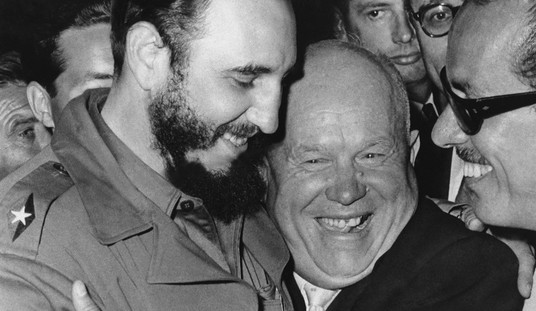Shouldn’t the gas-tax holiday idea have died with Hillary Clinton’s campaign hopes last Tuesday? Not according to economist Bryan Caplan, who explains in the New York Times that it might have limited value in keeping Congress from doing something even more stupid in response to rising gas prices. The problem that Caplan’s explanation creates is that stupid policies are not necessarily exclusive to one another:
The main causes of high gas prices are probably factors beyond our control, like rapid growth in China and India and low real interest rates. But voters don’t want to hear this; they want politicians to “do something!”
During our last big energy crisis, in the 1970s, “something” turned out to be a salad of populist nonsense: price controls, rationing, windfall profits taxes, arcane loopholes and lots of lawsuits. That political response turned an inconvenience into a disaster.
We can do better this time. Since in an election year Congress will feel compelled to show the voters that it feels their pain, let’s do something that at least keeps energy markets in good working order. The tax holiday fits the bill. Markets will adjust to it, no problem. And it won’t cost much — the estimated $9 billion in lost revenue is about $30 per person. That’s not a bad price to pay for a little insurance against a rerun of misguided ’70s measures.
Second, even a “giveaway” to the oil industry sets a positive course for the future. During the last crisis, the industry was a scapegoat for scarcity. Politicians scrambled to stop oil companies from profiting from the crisis, even though temporarily high profits end shortages by giving businesses an incentive to figure out how to increase output.
It’s naïve to think that the oil companies have forgotten the ’70s. They know there’s a decent chance that economic populism will return. In fact, it already has: Senator Clinton’s full proposal is to combine her tax holiday with a ’70s-style windfall profits tax.
Which is why Caplan’s advice makes no sense. The gas-tax holiday doesn’t preclude more foolish policy; if anything, it invites ideas like windfall-profits taxes. The government will seek to recoup the lost revenue in some manner, rather than doing something useful like cost-cutting. That’s why Hillary Clinton wedded the two together. George Bush would veto such a tax scheme this year, and a President McCain would veto it next year, but either a President Obama or President Hillary Clinton would not just sign a windfall-profits tax but actively encourage Congress to pass one.
It’s long past time for a little straight talk, my friends, on the uselessness of the gas-tax holiday. Gas prices did not skyrocket because of federal taxes on gasoline, and their removal will shave about $2.50 off a fill-up. The holiday solves nothing and in fact makes the problem worse, because an initially lower price will increase demand, which will drive prices higher again, which the reapplication of the tax will exacerbate. It delays consideration of a responsible energy policy that could actually address the price of gasoline as well as the rest of the energy policy that Congress has muffed for the last six years after 9/11.
In that sense, Barack Obama is right: the holiday is nothing more than an election-year pander.
After the 9/11 attack made clear that war would create pressures on oil supply, as well as the rapid increase in demand from India and China, the US needed to start planning for the long term on energy. We needed to start drilling and producing our own oil in much higher quantities, and we needed to build refineries to produce our own gasoline; we’re importing 20% of the latter now, and that number will rise significantly without more refinery capacity in our own nation. Expanding both would lower prices and create American jobs, both beneficial to our economy.
We also needed less pandering on renewable energy sources. Instead of focusing on nuclear energy and clean coal, we offered billions in subsidies and mandates for ethanol, which not only makes the energy we use less efficient but has begun to seriously distort food markets around the world. Congress should have eliminated regional mixture mandates as Bush did after Katrina and Rita disrupted a major portion of our narrow refining capacity in favor of one national mixture to allow for maximum efficiency, and therefore cost reductions, in our supply.
None of these measures got serious consideration because of the same kind of short-term thinking exemplified by the gas-tax holiday. It would take years, Congress said in 2002, to bring all of these assets on line in sufficient force to make an impact on energy prices. Well, here we are, years later, paying for that short-term thinking. Where will we be years from now, after listening to that excuse again?
John McCain, Hillary Clinton, and Barack Obama had better start offering real solutions to the energy crisis now if we expect to ever solve it at all. It will require long-term restructuring of our energy production and necessarily require us to produce more of our own resources domestically while speculative solutions continue to develop. Otherwise, the only holiday any of us will see is when we spend all weekend at the pumps waiting for our weekly ration of fuel.









Join the conversation as a VIP Member